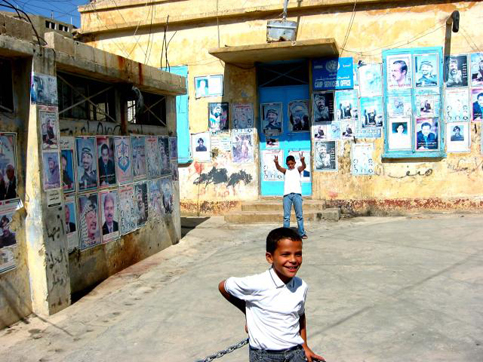- IRIN. March, 11th, 2008.

- Photo: by Stefan Christoff. Palestinian youth in the Bekaa Valley, Lebanon.
BEKAA VALLEY: A ploughed field and a dirt road form the walls of Atieh Ahmad’s “prison”, belying its setting in the sweeping expanse of Lebanon’s Bekaa Valley.
“I can’t go as far as the main road because I don’t have an ID,” said the 64-year-old father of two, perched on sofa cushions spread on the grass outside his tent-like shack.
“There’s no work because I don’t have an ID and I’m old, so I don’t have the money to register the children at the local school and we hardly have a bite to eat.”
Ahmad is among roughly 3,000 Palestinians who live in Lebanon without legal papers, known as “non-ID” refugees. Recognised by neither the Lebanese authorities nor the UN agency for the Palestinians, UNRWA, Ahmad lives on hand-outs from a local charity and the few vegetables he can grow.
Some 400,000 registered Palestinian refugees live in Lebanon, about half of them in 12 ramshackle camps scattered across the country. They live as second class citizens, denied the right to work in professional vocations or to own property.
Worst off
Worst off are the non-ID refugees, who risk arrest once outside the autonomous security system of the Palestinian-controlled camps. Some, like Ahmad, rent homes in villages, but are afraid to venture as far as the main road for fear of contact with the authorities.
“The biggest problem is that the non-ID Palestinians cannot move freely inside the country,” says Mireille Chiha, project manager for the Danish Refugee Council (DRC), which documents and lobbies for the refugees. “If they are arrested at a checkpoint they could be put in prison and many are. Some have not left their camps for 15-20 years.”
One such incident in 2001 drew the authorities’ attention to the existence of thousands of undocumented Palestinians living in fear of discovery. Hosni Ghazal was stopped at a checkpoint outside Ain al-Helweh, the largest camp in Lebanon, and told to get out of his car. He panicked and ran away, and soldiers shot him dead. The source of his panic, said the DRC, was his forged ID.
Left in limbo
Most non-ID Palestinians are either former `fedayin’ or descendents of the Palestinian fighters and came to Lebanon in the 1970s after being driven from Jordan after the “Black September” conflict with the Jordanian monarchy.
Then, the Palestine Liberation Organisation (PLO) ruled Lebanon’s camps and had a strong infrastructure. When the PLO was forced to leave Lebanon following the Israeli invasion of 1982, that system broke down and those who had got by without identification were left in limbo.
Not officially existing entails a host of problems, Chiha said.
UNRWA often allows non-ID children to attend its schools – but they cannot pass their examinations at age 18 and gain qualifications because that requires legal papers. Simply owning a car or motorbike legally is similarly out of reach.
“Access to healthcare is also a problem, especially for secondary healthcare such as operations,” Chiha said.
Hope kindled
Since a 2005 government initiative to improve Palestinian living conditions, hope has kindled for the non-ID refugees. DRC is working with UNRWA, the PLO – which opened an office in Lebanon in 2006 for the first time since the 1975-1990 Civil War – and Lebanon’s General Security state intelligence body, towards giving ID cards to refugees without them. Details have still to be hammered out.
“We still don’t know what rights will be attached to the new card,” Chiha said. “Will they get a laissez-passer from the Lebanese authorities to travel abroad? Will they have the right to work? But for sure this is a big step. They will at least not be subject to arbitrary arrest.”
UNRWA spokeswoman Hoda al-Turk said the file was with the General Security, but believed the new identification papers to be “imminent”.
“We’ll be ready to provide all our services to these Palestinians once they have their documents, though they already in practice receive schooling and basic healthcare,” she said.
Avoiding friction
Because of the sensitivity of relations with their hosts – some of whom blame the Palestinian presence for the Civil War – the initiative has been brokered quietly. Anything that implies “adding” to the refugee population in Lebanon could cause friction, particularly given the country’s fragile sectarian balance.
Even marriage presents obstacles for the non-ID Palestinians, whose union can be religiously sanctioned, but not legally registered.
Majla Jarrar, a 16-year-old who lives with her mother in a two-room flat in Burr Elias, a village in the Bekaa Valley, dropped out of school to work in a shop last year because she had no chance of sitting the exams. Worse still, she says, was losing two suitors.
The second got so far as asking her mother for her hand. But then his father found out she had no papers, Jarrar said.
“His family said I only wanted him for his Lebanese nationality,” she said. “It upset me so much – I can’t imagine how I’ll ever marry.”



“peace” out to revolution
تعليق meg — 31 mars 2008 @ 20:31